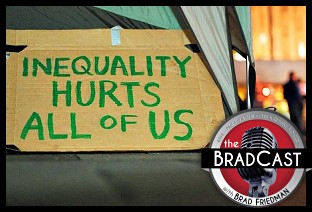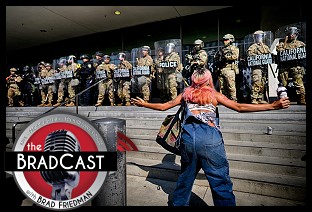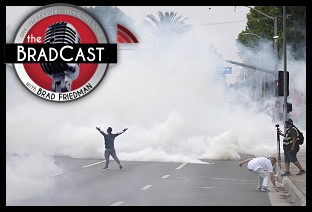 On today's BradCast, after some quick news on the House Democrats' much-needed omnibus election and ethics reform bill (HR1) to expand voting rights and on elected South Dakota Republicans now working to restrict voting in the state, it's on to our main story today. [Audio link to complete show is posted below.]
On today's BradCast, after some quick news on the House Democrats' much-needed omnibus election and ethics reform bill (HR1) to expand voting rights and on elected South Dakota Republicans now working to restrict voting in the state, it's on to our main story today. [Audio link to complete show is posted below.]
"Someone has to explain, if our economy is doing so great, how come everyone is broke?," Bill Maher asked during a recent segment of HBO's Real Time in the middle of Trump's 35-day federal government shutdown over December and January. "To me, the real lesson of this government shutdown," he argued, "is that we found out that federal workers, quintessential middle-class jobs, can't afford to miss one paycheck!" He's right. Remarkable stories made their way into the media during the shutdown, about struggling furloughed federal workers, some of whom had been working for the same agencies for decades, forgoing medical care, at risk of losing their homes or being forced to use free food pantries after missing one single pay day.
The U.S. has been slashing taxes, largely for the wealthy and corporations, for decades now as middle-class wages have remained stagnant and poverty continues to grow in the richest nation on earth. That, even as the rich get obscenely richer and Americans are told we simply can't afford our existing social safety nets and government programs, much less expansions of them to include Medicare for All, a Green New Deal or free college tuition --- even though they are all wildly popular ideas. As Ernie Canning recently summarized: "81% of the electorate support a Green New Deal. 70% of all Americans --- including 52% of Republicans and 84% of Democrats --- support Medicare for All. Some 75% of Americans support tuition free college. 82% of Americans want the federal government to negotiate lower prescription drug prices. 59% support the Ocasio-Cortez proposal to raise the top marginal tax rate to 70%."
So, did the month long federal government shutdown teach us anything about how close most Americans are to the brink? Did our elected officials (ahem, Republicans) actually notice or care? This past week, U.S. Senate Majority Leader Mitch McConnell (KY) and GOP Senators Chuck Grassley (IA) and John Thune (SD) introduced the "Death Tax Repeal Act of 2019" to do away all together with estate taxes for the very wealthy, even though, as our guest today points out in a recent Common Dreams column, the current estate tax applies to fewer than two dozen people in those three Senators' states combined. Racial inequality means that economic inequality is even worse for those who aren't white, begging the question as to why it is described as "economic anxiety" when white people are feeling squeezed, but dismissed as poverty and laziness from everyone else.
We're joined to discuss all of this today by author CHUCK COLLINS, an expert on U.S. inequality and the racial wealth divide at the Institute for Policy Studies. He is also co-editor of Inequality.org and a contributing columnist at many outlets.
Collins discusses how the inequality gaps have become so wide in the U.S.; why so many continue to support candidates for elected office who work against the economic interests of the poor and working class; how attitudes about race exacerbate the problem; and how we may finally be "heading into a re-alignment" with a new crop of progressive elected officials and a potential awakening of the American people after being conned for last 40 years.
"I think a lot of people were surprised about the percentage of people who live in poverty, and who live paycheck to paycheck," he tells me about lessons learned during the shutdown. "I think it was eye-opening and even empathy-producing. I think people silently suffer the economic insecurities that they experience and this was another shared moment where a lot of people were saying, 'Yeah, I don't have any savings, I have no cushion, I have to go to the food bank and I'm a median income worker.' So I think it opened a lot of eyes, and potentially some hearts and minds, as well."
"Forty years of stagnant wages has certainly hit a lot of white households," Collins explains. "There is a lot of rising insecurity, certainly coming out of the economic meltdown a decade ago. A lot of white families experienced a sort of shock and vulnerability and, I would say, kind of keeps us from being able to see the parallel experience of everyone else, and the fact that the racial inequalities are even deeper, and even more insecure. 37% of African-American households --- zero or negative wealth. 33% of Latino households --- underwater. So, yes, a lot of white people are feeling the pain, but a lot of people of all colors and all races are feeling that insecurity and pain."
"Why wouldn't we want to have a minimal safety net?," he asks rhetorically, in response to my questions about whether so many popular policy ideas to help close the inequality gaps and lift the poor and middle-class may finally being getting a foothold. "Why wouldn't we want to have a system of higher education that allows young people to go to college and graduate without tens of thousands of dollars in debt? It worked for the post-World War II generation. It worked for millions of people who got debt-free college and launched their lives and careers. Have we forgotten that entirely? There's a certain amnesia at work, as well --- that public investments and public support have made it possible for lots of people to move forward in their lives and have good lives. And we shouldn't forget that when it comes to the next generation."
"I think we're heading into a kind of realignment," Collins adds optimistically, underscoring some of his recent articles on the trillions in revenue that could be raised through Elizabeth Warren's proposal to tax the ultra-wealthy and Bernie Sanders' plan to increase not decrease the estate taxes on inheritances over $1 billion. "I think most people understand that these inequalities and insecurities are a dead end. They also are getting tired of hearing billionaires telling us what to do and how the economy should be organized, realizing that this corrosive corruption and concentration of wealth at the top is bad."
There is lots to dig into in today's full conversation with Collins.
Finally, we close today's show with some must-listen conversation from the World Economic Forum in Davos, Switzerland, where two members of a panel on income inequality (historian Rutger Bregman and Oxfam International's Winnie Byanyima) take on the millionaires and billionaires in attendance for their unwillingness to face "the real issue of tax avoidance and the rich not paying their fair share." They also take on an outraged challenge from an audience member (former CFO of Yahoo, Ken Goldman) which only seems to underscore the need to raise taxes on the wealthy in order to lift up the needy and struggling workers around the globe...
(Snail mail support to "Brad Friedman, 7095 Hollywood Blvd., #594 Los Angeles, CA 90028" always welcome too!)
|


 Sunday 'Total Obliteration' Toons
Sunday 'Total Obliteration' Toons Thank You For Your Attention to This Matter:
Thank You For Your Attention to This Matter: 'Green News Report' 6/26/25
'Green News Report' 6/26/25
 Mamdani Primary 'Win' Augurs New Generation of Progressives Rising: 'BradCast' 6/25/25
Mamdani Primary 'Win' Augurs New Generation of Progressives Rising: 'BradCast' 6/25/25 U.S. Authoritarianism Under-way (But We're Still Here to Fight It): 'BradCast' 6/24/25
U.S. Authoritarianism Under-way (But We're Still Here to Fight It): 'BradCast' 6/24/25 'Green News Report' 6/24/25
'Green News Report' 6/24/25 'Anti-War' Trump Attacks a Mid-East Nation on False Claims About WMD: 'BradCast' 6/23/25
'Anti-War' Trump Attacks a Mid-East Nation on False Claims About WMD: 'BradCast' 6/23/25  Sunday 'Peacemaker' Toons
Sunday 'Peacemaker' Toons Senate Health Care Cuts 'More Extreme' Than House Version: 'BradCast' 6/19/25
Senate Health Care Cuts 'More Extreme' Than House Version: 'BradCast' 6/19/25 'Green News Report' 6/19/25
'Green News Report' 6/19/25 What 'Anti-War President'? MAGA Civil War Over Trump, Iran: 'BradCast' 6/18/25
What 'Anti-War President'? MAGA Civil War Over Trump, Iran: 'BradCast' 6/18/25 Trump Calls for 'Remigration', a Codeword for 'Ethnic Cleansing': 'BradCast' 6/17/25
Trump Calls for 'Remigration', a Codeword for 'Ethnic Cleansing': 'BradCast' 6/17/25 'Green News Report' 6/17/25
'Green News Report' 6/17/25 Last Weekend Today: 'BradCast' 6/16/25
Last Weekend Today: 'BradCast' 6/16/25 Sunday 'Despot Times, Despot Measures' Toons
Sunday 'Despot Times, Despot Measures' Toons Then They Came for the U.S. Senators: 'BradCast' 6/12/25
Then They Came for the U.S. Senators: 'BradCast' 6/12/25 'Green News Report' 6/12/25
'Green News Report' 6/12/25 Lawless Trump Warms Up for Insurrection Act: 'BradCast' 6/11/25
Lawless Trump Warms Up for Insurrection Act: 'BradCast' 6/11/25 Trump Inciting Violence, State of Fear in L.A., Elsewhere: 'BradCast' 6/10/25
Trump Inciting Violence, State of Fear in L.A., Elsewhere: 'BradCast' 6/10/25 Nevermind Elon and Epstein Files, Trump Declares L.A. 'Riots'!: 'BradCast' 6/9/25
Nevermind Elon and Epstein Files, Trump Declares L.A. 'Riots'!: 'BradCast' 6/9/25 'Jesus Weeps' at Trump's
'Jesus Weeps' at Trump's 300k 'Preventable' Deaths Since Trump USAID Shutdown: 'BradCast' 6/4/25
300k 'Preventable' Deaths Since Trump USAID Shutdown: 'BradCast' 6/4/25 Storm Warnings: 'BradCast' 6/3/25
Storm Warnings: 'BradCast' 6/3/25 SCOTUS Ignores Own Precedents In Recent 'Emergency' Rulings: 'BradCast' 6/2/25
SCOTUS Ignores Own Precedents In Recent 'Emergency' Rulings: 'BradCast' 6/2/25 'A World of Tyrants, Bribes, and Influence': 'BradCast' 5/22/25
'A World of Tyrants, Bribes, and Influence': 'BradCast' 5/22/25
 VA GOP VOTER REG FRAUDSTER OFF HOOK
VA GOP VOTER REG FRAUDSTER OFF HOOK Criminal GOP Voter Registration Fraud Probe Expanding in VA
Criminal GOP Voter Registration Fraud Probe Expanding in VA DOJ PROBE SOUGHT AFTER VA ARREST
DOJ PROBE SOUGHT AFTER VA ARREST Arrest in VA: GOP Voter Reg Scandal Widens
Arrest in VA: GOP Voter Reg Scandal Widens ALL TOGETHER: ROVE, SPROUL, KOCHS, RNC
ALL TOGETHER: ROVE, SPROUL, KOCHS, RNC LATimes: RNC's 'Fired' Sproul Working for Repubs in 'as Many as 30 States'
LATimes: RNC's 'Fired' Sproul Working for Repubs in 'as Many as 30 States' 'Fired' Sproul Group 'Cloned', Still Working for Republicans in At Least 10 States
'Fired' Sproul Group 'Cloned', Still Working for Republicans in At Least 10 States FINALLY: FOX ON GOP REG FRAUD SCANDAL
FINALLY: FOX ON GOP REG FRAUD SCANDAL COLORADO FOLLOWS FLORIDA WITH GOP CRIMINAL INVESTIGATION
COLORADO FOLLOWS FLORIDA WITH GOP CRIMINAL INVESTIGATION CRIMINAL PROBE LAUNCHED INTO GOP VOTER REGISTRATION FRAUD SCANDAL IN FL
CRIMINAL PROBE LAUNCHED INTO GOP VOTER REGISTRATION FRAUD SCANDAL IN FL Brad Breaks PA Photo ID & GOP Registration Fraud Scandal News on Hartmann TV
Brad Breaks PA Photo ID & GOP Registration Fraud Scandal News on Hartmann TV  CAUGHT ON TAPE: COORDINATED NATIONWIDE GOP VOTER REG SCAM
CAUGHT ON TAPE: COORDINATED NATIONWIDE GOP VOTER REG SCAM CRIMINAL ELECTION FRAUD COMPLAINT FILED AGAINST GOP 'FRAUD' FIRM
CRIMINAL ELECTION FRAUD COMPLAINT FILED AGAINST GOP 'FRAUD' FIRM RICK SCOTT GETS ROLLED IN GOP REGISTRATION FRAUD SCANDAL
RICK SCOTT GETS ROLLED IN GOP REGISTRATION FRAUD SCANDAL VIDEO: Brad Breaks GOP Reg Fraud Scandal on Hartmann TV
VIDEO: Brad Breaks GOP Reg Fraud Scandal on Hartmann TV RNC FIRES NATIONAL VOTER REGISTRATION FIRM FOR FRAUD
RNC FIRES NATIONAL VOTER REGISTRATION FIRM FOR FRAUD EXCLUSIVE: Intvw w/ FL Official Who First Discovered GOP Reg Fraud
EXCLUSIVE: Intvw w/ FL Official Who First Discovered GOP Reg Fraud GOP REGISTRATION FRAUD FOUND IN FL
GOP REGISTRATION FRAUD FOUND IN FL
































